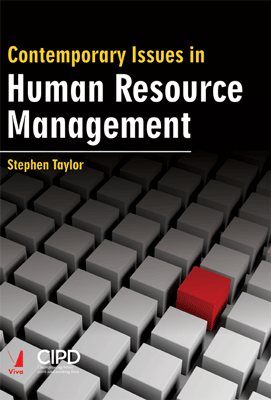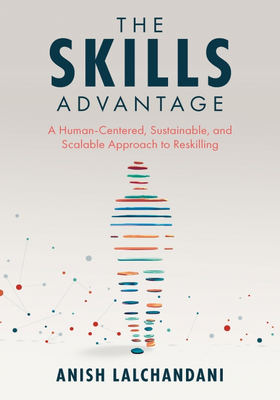Contemporary Issues in Human Resource Management
Contemporary Issues in Human Resource Management
₹895.50 ₹995.00 Save: ₹99.50 (10%)
Go to cartISBN: 9789386243379
Bind: Paperback
Year: 2017
Pages: 334
Size: 8 X 10 Inch
Publisher: Chartered Institute of Personnel and Development
Published in India by: Viva Books
Exclusive Distributors: Viva Books
Sales Territory: India, Nepal, Pakistan, Bangladesh, Sri Lanka
Reviews:
—Michael Muller-Camen, Middlesex University Business School
"Taylor has a crisp student-friendly style that explains?why?fashionable management fads can morph into more embedded HR practices. Contemporary lssues in HRM offers both scholars and practitioners accessible insights into current and emergent trends concerning with the way people are managed. It is not a prophecy about the future of the profession but a series of well-informed pathways from which meaningful implications can be developed and explored further."
—Tony Dundon, School of Business and Economics, National University of Ireland Galway; Chief Examiner for the Chartered Institute of Personnel and Development (CIPD); and Editor of the Human Resource Management Journal
"This text fills a major gap in the UG and PG market.The coverage is comprehensive and the 2-part format and the chapters within them offer students a clear structure to both follow and?dip into for workshop/assignment purposes etc."
—Margaret May, London Metropolitan University.
Description:
Focusing on contemporary and future issues rather than the usual operational HRM topics,Stephen Taylor's innovative new textbook is ideal for Business students taking an advanced HRM module at undergraduate or Master's level, as well as students taking other modules which explore people management in relation to the wider business context.
Contemporary lssues in Human Resource Managementis uniquely holistic in its approach to advanced HRM and takes students on clear and logical journey through a comprehensive set of issues. Taylor writes in an extremely clear and accessible way and has packed the text with excellent learning features that will really enable students to engage with the subject, challenging their perceptions of HRM and encouraging analytical thinking.
A truly student-focussed text, Contemporary Issues in Human Resource Managementoffers an in depth and critical look at HRM and comes with comprehensive student and tutor websites to enhance the learning experience even further.
Target Audience:
Ideal for business students taking an advanced HRM module at undergraduate or Master's level, as well as students taking other modules which explore people management in relation to the wider business context.
Contents:
List of Figures and Tables
Walkthrough of textbook features and online resources
Chapter 1: Introduction • Learning outcomes • Contemporary trends: towards a new HR? • Future agendas • Key learning points • Explore further • References
Chapter 2: Competition and choice • Introduction • Learning outcomes • Competitive intensity • Financialisation • The impact of increased competitive intensity • Key learning points • Explore further • References
Chapter 3: People and skills • Introduction • Learning outcomes • Demand for people • Supply of people • Demand for skills • Supply of skills • The hourglass metaphor • Key learning points • Explore further • References
Chapter 4: Regulation and public policy • Introduction • Learning outcomes • A regulatory revolution • Contemporary debates • Likely future developments • The wider public policy agenda • Key learning points • Explore further • References
Chapter 5: Social trends • Introduction • Learning outcomes • Affluence and inequality • Individualism • Ethical awareness • Key learning points • Explore further • References
Chapter 6: Flexibility and change • Introduction • Learning outcomes • Change management • Managing the consequences of change • Flexible working • Conclusions • Key learning points • Explore further • References
Chapter 7: Competing for people • Introduction • Learning outcomes • Reward • Employer branding • Labour market segmentation • Key learning points • Explore further • References
Chapter 8: Managing expectations • Introduction • Learning outcomes • Hopes and expectations • Expectancy theory • Equity theory • Psychological contracts • Managing expectations in practice • Are expectations changing? • Key learning points • Explore further • References
Chapter 9: Engaging people • Introduction • Learning outcomes • Defining engagement • Current interest in engagement • Benefits for employees • Benefits for employers • Improving levels of employee engagement • Criticisms of employee engagement initiatives • Line management • Key learning points • Explore further • References
Chapter 10: Managing knowledge and learning • Introduction • Learning outcomes • Human capital • Knowledge management • Learning organisations • Managing knowledge workers • Key learning points • Explore further • References
Chapter 11: Managing an international workforce • Introduction • Learning outcomes • Convergence and divergence • Cultural differences • Institutional differences • Expatriates • Culturally diverse teams • Structural issues • Key learning points • Explore further • References
Chapter 12: Managing ethically • Introduction • Learning outcomes • Ethical decision-making in HRM • theory • Ethical decision-making in HRM • practice • Equality and diversity • Key learning points • Explore further • References
Chapter 13: Developing HR strategies • Introduction • Learning outcomes • Alternative conceptions of HR strategy • Contingency models • Positioning an organisation in the labour market • Contemporary approaches to human resource planning • Key learning points • Explore further • References
Chapter 14: Managing the HR function? Introduction • Learning outcomes • Adding value • Outsourcing • Ulrich's models • Evaluating the HR contribution • Evaluation criteria • Evaluation methods • Cutting-edge approaches to evaluation • Key learning points • Explore further • References
Index
About the Author:
Stephen Taylor is Senior Lecturer at Manchester Metropolitan University Business School and the CIPD's examiner for the Managing in a Strategic Business Context paper.







